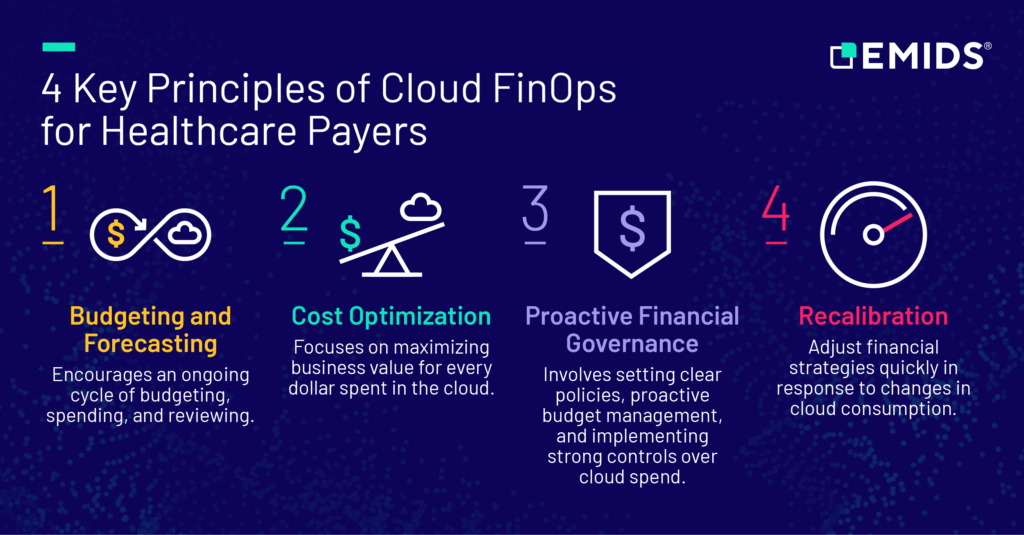In healthcare, controlling costs while maintaining operational efficiency is challenging, and variable IT costs add complexity. Migrating IT infrastructure to the cloud introduces new financial complexities in the shift from traditional capital expenditure (CapEx) models to the cloud’s operational expenditure (OpEx) framework. This is where Cloud FinOps comes into play.
What is Cloud FinOps?
Cloud FinOps (FinOps being short for Financial Operations) provides a strategic approach to managing cloud expenses, ensuring that every dollar spent drives business value and aligns with organizational objectives. It’s a practice that focuses on cost visibility, governance, accountability, and the continuous optimization of cloud expenditures.
By leveraging FinOps principles, healthcare payers can gain greater financial control, optimize their cloud costs and foster a culture of financial accountability.
And How Does Cloud FinOps Relate to Healthcare?
Cloud FinOps plays into healthcare in a similar way that it plays into any business – it helps healthcare organizations manage and optimize the complexity of cloud costs as cloud-based solutions become increasingly entwined with their day-to-day operations.
This is particularly pertinent for payers, who are increasingly reliant on the cloud for data storage, analytics, electronic health records (EHR), telemedicine, and patient care applications. FinOps enables healthcare payers to maximize their investments in the cloud, while optimizing costs.
FinOps Principles: Best Practices for Healthcare Payers
There are four key principles of FinOps that healthcare payers can implement to optimize their cloud expenditures. By understanding and applying these strategies, healthcare payers can not only control their cloud spending but also maximize the value derived from their cloud investments, ultimately enhancing their operational efficiency and improving their delivery of quality care and member experience.
Unlock the secrets of cloud cost optimization in healthcare – download the eBook now.

Budgeting and Forecasting
Maintaining an ongoing cycle of budgeting, spending, and reviewing is crucial to ensure that financial strategies remain aligned with actual cloud usage and business objectives. By implementing continuous feedback loops, healthcare payers can make real-time adjustments to their cloud spending, enhancing their ability to respond to fluctuating demands and unforeseen expenses. This dynamic approach not only ensures that financial plans are always up to date but also helps in identifying cost-saving opportunities and optimizing resource allocation for better operational efficiency.
Cost Optimization and Value Alignment
Maximizing the business value of every dollar spent on cloud services involves continuously monitoring the price-to-performance ratio of cloud investments and identifying areas for cost reduction without compromising service quality. Strategies such as right-sizing resources, using spot instances and opting for cost-effective storage can significantly reduce expenses. By aligning cloud spending with business goals and patient care objectives, payers can ensure investments directly contribute to improving operational performance and patient outcomes for higher return on investment.
Proactive Financial Governance
Proactive financial governance sets clear policies and diligent budget management to control cloud spending. Healthcare payers must implement robust financial controls, including setting spending limits and usage thresholds, conducting regular financial reviews, and engaging stakeholders in the governance process. This proactive approach helps prevent budget overruns and ensures that cloud expenditures are always aligned with organizational priorities. By taking a proactive stance, payers can mitigate financial risks, improve compliance with regulatory requirements, and maintain a stable financial environment conducive to strategic growth.
Recalibration
Agility in financial practices allows healthcare payers to quickly adapt to changes in cloud consumption and evolving business needs, and accommodates rapid adjustments in spending. Dynamic forecasting, real-time monitoring, and automated budgeting tools enable payers to swiftly respond to unexpected changes in cloud usage, ensuring that resources are allocated efficiently.
Adopting these four key principles of FinOps—can significantly enhance cloud cost management for healthcare payers. They provide a structured approach to aligning cloud investments with business goals, ensuring financial transparency, and driving operational efficiency. By integrating these FinOps strategies, healthcare payers can achieve optimal cloud cost control, fostering a sustainable financial model that supports rapid innovation, faster data-driven decision making, and enhanced and secure patient data.
Embracing FinOps is not just about cost savings; it’s about strategic financial stewardship in the digital age. Payers must adopt FinOps to fully realize the value of the cloud and gain its benefits, fostering innovative healthcare solutions, operational agility and enhanced member care and engagement.

